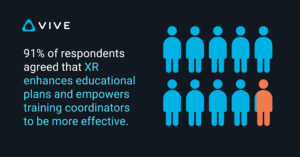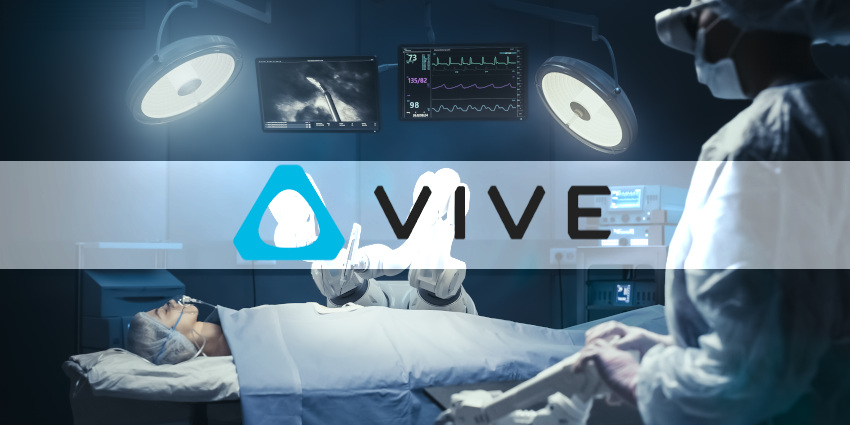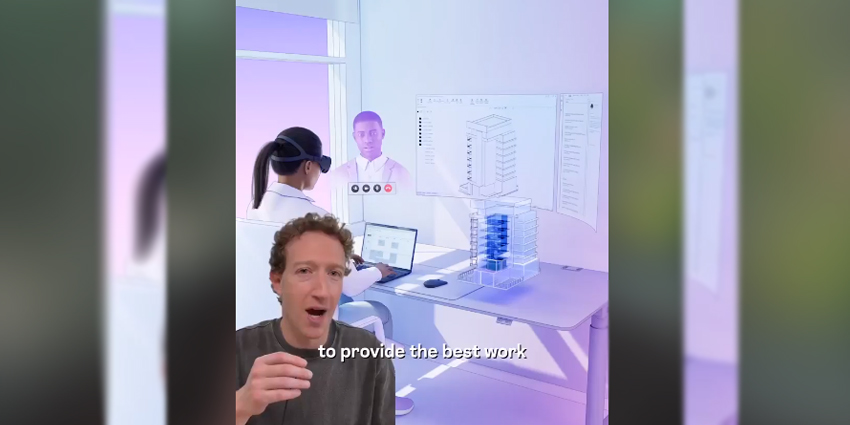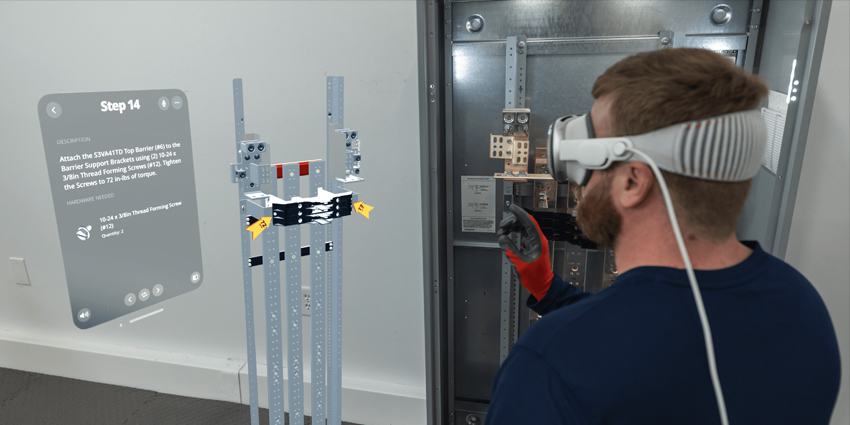A recent HTC VIVE study has found that extended reality (XR) technologies have become an “invaluable” tool for training healthcare staff in key skills and capabilities. With immersive tools, medical teams can train staff in competencies like conducting procedures and communicating more effectively with patients.
The survey comes as BlueWeave Consulting analysts expect the extended reality healthcare market to grow at a compound annual growth rate (CAGR) of 42 percent, with revenues exceeding $5.3 billion by 2028.
According to the findings, nine of ten medical professionals responded that XR had boosted their educational plans by helping them to become more effective on the job. 84 percent of respondents added that they liked or loved training with XR technologies.
HTC VIVE’s ‘The State of Extended Reality (XR) Training in Healthcare’ report surveyed 400 medical and social assistance professionals across the United States. The report also explores how XR technologies are empowering healthcare training procedures and have influenced healthcare organisations.
For many in the industry, XR training eliminated several ‘bottlenecks’ linked to more traditional instructional techniques. This allowed healthcare professionals to train staff “more quickly, more effectively, and with fewer resources,” the report found.
Pearly Chen, Vice-President, HTC VIVE, said in a statement,
“Our survey data confirms that immersive technologies like XR can redefine conventional healthcare training – empowering medical professionals to hone crucial skills with unprecedented effectiveness and scalability”
Key Report Findings

HTC VIVE’s latest report found that roughly 91 percent of healthcare professionals agreed that XR enhanced educational plans for learners and empowered training facilitators to become more effective at teaching.
It also noted that 86 percent of healthcare professionals stated that XR training programmes motivated trainees to become more confident and develop muscle memory, leading to more successful patient outcomes.
Additionally, 75 percent of respondents stated that incorporating XR technologies in their training curricula would allow them to complete their programmes in less time. 81 percent of those surveyed added that XR training provided their organisations with a competitive edge to attract top-level talent.
Finally, 86 percent of participants in the survey from organisations that had not adopted XR in their training curricula said they would do so by no later than 2026.
Chen added: “Our survey data confirms that immersive technologies like XR can redefine conventional healthcare training – empowering medical professionals to hone crucial skills with unprecedented effectiveness and scalability.”
She concluded,
“By adopting XR, healthcare organizations are not just updating their training methods; they are strategically positioning themselves for advancements in patient care and operational efficiency”
Vuzix Explores Medical Training, Use Cases
The survey comes after similar research from AR solutions provider Vuzix in June, which surveyed over 500 surgeons across the US. Conducted by Censuswide, the survey revealed largely positive support for XR technologies for use in surgical workflows.
According to the findings, 25 percent of surgical teams had incorporated AR head-mounted displays (HMDs), 31 percent considered using them, and 19 percent had previously experimented with AR tools.
Furthermore, around 31 percent of those surveyed stated they would consider using AR smart glasses for their operations, and an additional 25 percent responded they currently implemented them.
In education, Queen Mary University of London students had launched one of the United Kingdom’s first-ever lectures on a Metaverse platform. The initiative aimed to train medical students to become doctors, nurses, surgeons, and staff.
Professor Shafi Ahmed, Surgeon and Lecturer in Surgery, Queen Mary University of London, led the unprecedented lectures for the university.
In addition, XR Today recently interviewed the world-renowned surgeon on the benefits of using Vuzix’s AR smart glasses for surgical procedures. He is a long-standing expert in XR-based instruction across the medical field, incorporating immersive devices like the Meta Quest family of devices, along with holograms and avatars, into his curricula.
RealWear, Warpin Engage Trainees with Immersive Training
RealWear, an immersive wearables firm based in Vancouver, Washington, also collaborated with the North Tees and Hartlepool National Health Services (NHS) Foundation Trust to roll out devices for surgeons.
Using the assisted reality (aR) tools, medical teams in the northwestern region could train students by providing them with a close-up view of medical surgeries. Doing so led to significantly higher learner retention rates and engagement during and after procedures.
Additionally, students received live-streamed footage of surgeries and could communicate directly with surgeons as they operated on patients in real time.
The healthcare teams also aimed to boost enrolment for those seeking operating room procedural training in line with the NHS England’s Long-Term Workforce Plan announced in late June this year.
The programme aims to tackle concerns with rising upskilling demand amid the labour skills shortages hitting the NHS.
Finally, the Swedish Red Cross partnered with XR firm Warpin Reality to release and distribute a VR medical trainer capable of boosting readiness in emergency situations. With the VR training module, workforces could upskill in critical competencies like First Aid to take on emergency scenarios encountered at the workplace or in everyday situations.
The training module led to more “empathetic” connections between First Aid learners and their patients, leading to greater confidence in resolving medical crises. It also led to faster time to readiness while training, reducing curriculum times from up to three hours to just around 30 minutes, Emma Ridderstad, VP and Founder, Warpin Reality, told XR Today.







